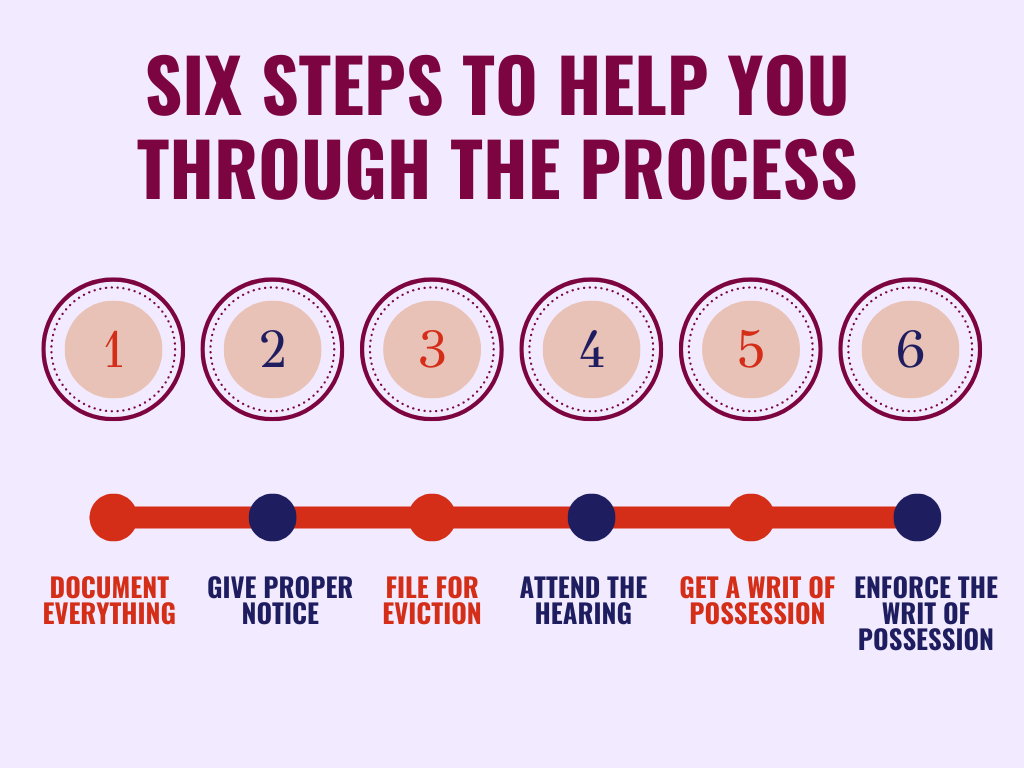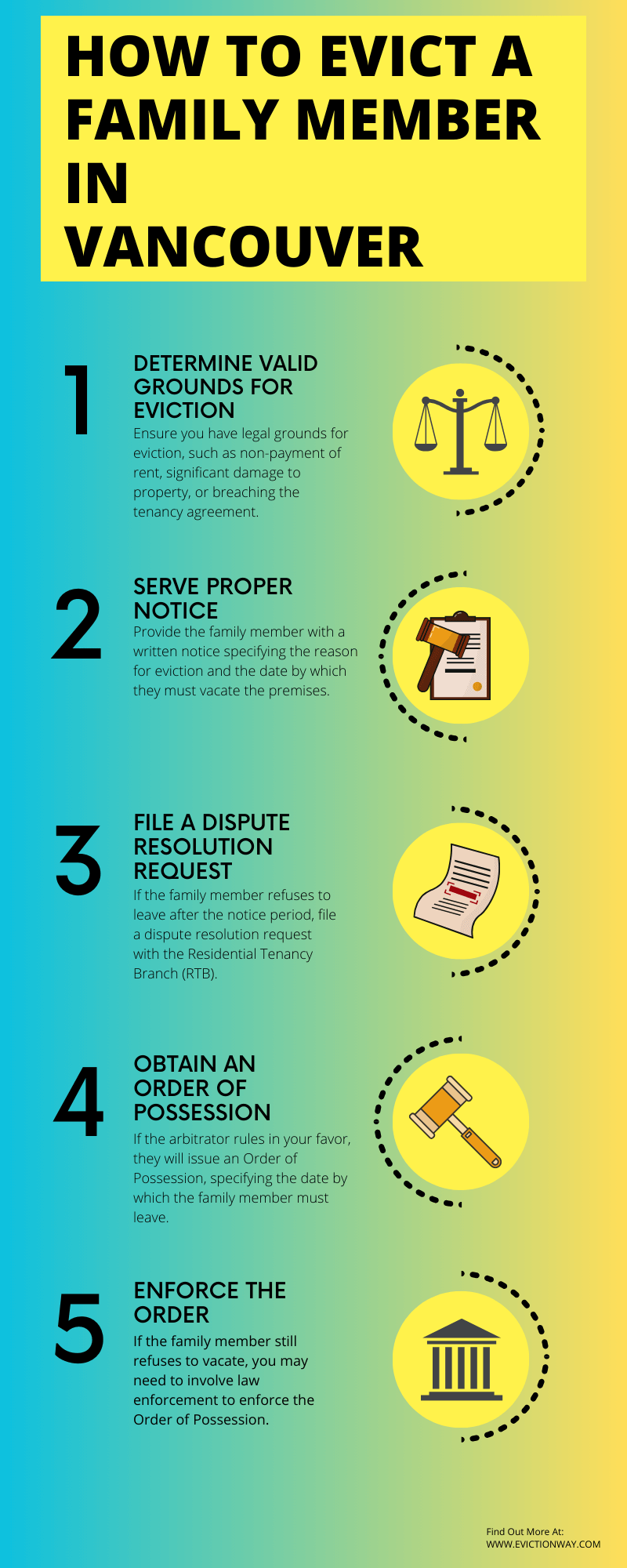Are you facing a situation where you need to evict a family member from your Vancouver property? This can be a challenging and emotionally charged situation, but it’s important to know your options and proceed legally. In this blog article, we’ll guide you through the process of evicting a family member in Vancouver, providing practical advice and legal tips to help you navigate this difficult situation.
Firstly, we’ll explore the best approach to evicting a family member in Vancouver. We’ll provide a step-by-step method to ensure you follow the proper legal procedures and protect your rights as a landlord. We’ll also share tips on how to remove a family member politely and respectfully, minimizing conflict and preserving family relationships as much as possible.
Finally, we’ll delve into the legal aspects of evicting a family member. We’ll discuss the relevant laws and regulations in Vancouver, providing you with a clear understanding of your rights and responsibilities. We’ll also provide legal tips to help you avoid potential pitfalls and ensure a smooth and successful eviction process.

How To Evict a Family Member In Vancouver
Evicting a family member can be a difficult and emotional process, but it is sometimes necessary to protect your rights and property. If you are considering evicting a family member in Vancouver, here are six tips to help you through the process:
1. Document Everything
Keep a record of all interactions with your family member, including any attempts to resolve the issue. This will help you if you need to go to court.
2. Give Proper Notice
In Vancouver, you must give your family member at least one month’s written notice to vacate the property. The notice must include the date by which they must leave and the reason for the eviction.

3. File for Eviction
If your family member does not leave by the date specified in the notice, you can file for eviction with the Residential Tenancy Branch (RTB). The RTB will hold a hearing to determine if you have grounds for eviction.
4. Attend the Hearing
It is important to attend the RTB hearing and present your case. You will need to provide evidence to support your claim for eviction.
5. Get a Writ of Possession
If the RTB rules in your favor, you will be granted a writ of possession. This document gives you the legal authority to have your family member removed from the property.
6. Enforce the Writ of Possession
Once you have a writ of possession, you can contact the Sheriff’s Office to have it enforced. The Sheriff will remove your family member from the property and return it to you.

How Much Does it Cost to Evict a Family Member in Vancouver?
The cost of evicting a family member in Vancouver can vary depending on the specific circumstances of the case. However, there are some general costs that you can expect to incur.
| Cost Category | Estimated Range | Notes |
|---|---|---|
| Legal Fees | $2,000 – $5,000 | Depends on lawyer complexity and experience, length of process, and potential disputes. |
| Court Filing Fees | $100 – $200 | Varies depending on specific court procedures. |
| Service of Notice Fees | $50 – $100 | Cost to have a process server deliver the eviction notice. |
| Moving Costs | $500 – $2,000 | Depends on size of the family member’s belongings and distance to their new location. |
| Storage Fees (Optional) | $100 – $500 | If the family member needs to store belongings temporarily. |
FAQs: Evicting a Family Member in Vancouver
Here are some of the most frequently asked questions about evicting a family member in Vancouver:
What are the grounds for evicting a family member in Vancouver?
Under the Residential Tenancy Act (RTA), you can only evict a family member if they have breached a term of their tenancy agreement, such as not paying rent, causing damage to the property, or engaging in illegal activities. You must also provide them with proper notice, which is typically one month for a month-to-month tenancy and two months for a fixed-term tenancy.
What is the process for evicting a family member in Vancouver?
The process for evicting a family member in Vancouver involves serving them with a Notice to End Tenancy, which outlines the reasons for the eviction and the date by which they must vacate the property. If they do not leave by the specified date, you can file an application with the Residential Tenancy Branch (RTB) to have them evicted. The RTB will then hold a hearing to determine if the eviction is justified.
What are some common challenges in evicting a family member in Vancouver?
Evicting a family member can be emotionally challenging, especially if you have a close relationship with them. It’s important to remember that you have the right to protect your property and your rights as a landlord. If you are facing challenges in evicting a family member, you may want to consider seeking legal advice or mediation.
What are some tips for evicting a family member in Vancouver?
Here are some tips for evicting a family member in Vancouver:
- Document all incidents that lead to the eviction.
- Serve the Notice to End Tenancy in person or by registered mail.
- Be prepared to provide evidence to the RTB if necessary.
- Stay calm and respectful throughout the process.
What are the consequences of illegally evicting a family member in Vancouver?
Illegally evicting a family member can have serious consequences, including fines, jail time, and a damaged relationship. It’s important to follow the proper legal procedures to ensure that the eviction is carried out fairly and legally.
Related:
How to Evict a Family Member in Mississippi
